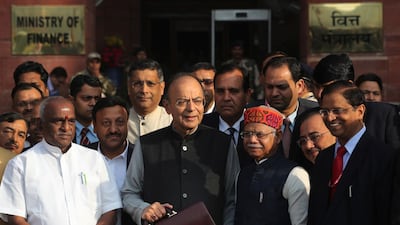The Indian government laid out plans in this year's budget to spend over 9 per cent than the previous year, with a higher allocation of funds for rural infrastructure, health care and agriculture, in a bid to win over voters ahead of parliamentary elections in 2019.
Arun Jaitley, the finance minister, presented his annual budget to parliament on Thursday – before the eight state elections over the coming year and the general elections next summer. He did so amid growing concerns about India's flagging economy and its inability to create enough jobs for the million people who enter the workforce every month.
"We are now firmly on course to achieve high growth of 8 per cent plus," Mr Jaitley said.
India’s economy is projected to expand between 6.5 to 6.75 per cent in the 2017-18 financial year—the lowest in the four years since Prime Minister Narendra Modi came to power, according to government figures.
Among big-ticket expenditure items is an increase in the minimum price at which the government buys grain from farmers. The new price will be 1.5 times the old price. At the moment, the minimum support price stands at around 1,550 rupees (Dh88.92) per 100 kilograms for rice, for example, and around 5,400 rupees per 100 kgs for lentils.
________________
Read more:
Rupee depreciation against the dollar keeps deficit running
Analysts say Modi's foreign investment reforms don't go far enough
________________
The government has earmarked a 20-billion-rupee fund to improve the transport, storage and sales infrastructure around the 22,000 state-run agricultural markets in the country. The capital outlay for the infrastructure sector accounts for about a fifth of total budgeted expenditure.
Agriculture accounts for 14 per cent of the Indian economy, employing at least 263 million Indians, 22 per cent of the country's population, according to government census data. Millions more depend upon the sector indirectly for their livelihood. The budget does not provide revenue estimates. Those emerge after the end of the tax year in March.
The measures targeting farmers were a response to a deepening crisis in the sector. Farmers have held protests across the country over their diminishing incomes. India suffered crippling droughts in 2014 and 2015, and prices of food products have since tumbled.
Mr Modi’s November 2016 move to demonetise large currency notes, in an effort to root out individuals who had stashes of untaxed and undeclared money, also hurt farmers. Vegetable prices, for example, were lower by 24 per cent compared to November 2015, and by 33 per cent the following month.
In response to farmer protests, state governments across India announced massive waivers of agricultural loans. The state of Maharashtra, for instance, agreed to waive 340 billion rupees in farmer loans last year.
The budget includes a new health insurance scheme to cover 500 million of India’s poorest people, dubbed “the world’s largest healthcare programme”. The scheme provides health insurance coverage of 500,000 rupees per family every year.
The government will spend 12bn rupees to create 150,000 new health and wellness centres around the country, to bring medical care "closer to the homes of people," Mr Jaitley said.
The budget also promised funds to build 10 million houses in rural India over the next two years. A new funding agency will also channel public and private investment into higher education, aiming to invest 1 trillion rupees over the next four years.
“I don’t think I can blame the budget for being motivated by scoring points in election, but the fiscal arithmetic is faulty,” Manmohan Singh, an economist and India’s previous prime minister, said. “This budget is high on projecting a bright picture, but how will that be sustained [given the deficit]?”
The new expenditures widen India’s fiscal deficit. As policy, India targets a deficit that is 3 per cent of the country’s GDP. Ahead of the budget, a Reuters poll of economists estimated Mr Jaitley’s target to be 3.2 per cent. Thursday's budget revealed the government faces 3.5 per cent deficit in 2017-18 and 3.3 per cent in 2018-19.
The wider shortfall is a function of shrinking revenue rather than outlandish expenditure, said John Samuel Raja, the founder of How India Lives, a firm that analyses government data.
"The total planned spending for 2018-19 is 24tn rupees. For the previous year, it was 22tn rupees, and 19.75tn the year before that," Mr Raja said. "So an increase of 10 or 11 per cent every year is standard."
But revenues haven’t kept pace with expenditure, he pointed out, “and that’s a very bad sign.”

